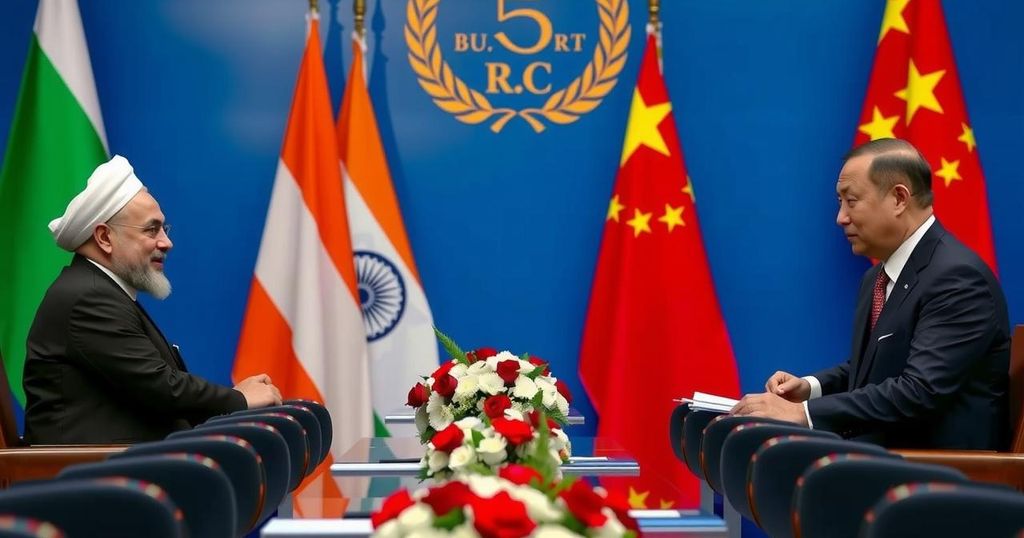Russian President Vladimir Putin hosted the BRICS Summit in Kazan, which aimed to discuss creating a “new world order” to mitigate Western hegemony and reduce reliance on the U.S. dollar. Leaders from Iran, India, China, and other countries focused on fostering cooperation and establishing alternative financial systems to counteract Western sanctions. The summit highlighted the varying approaches among member states, with calls for BRICS to pursue tangible reforms while addressing geopolitical tensions.
This week, President Vladimir Putin of Russia hosted representatives from over two dozen nations in Kazan for the annual BRICS Summit, a critical event aimed at forming a “new world order” that challenges Western dominance and reduces dependency on the U.S. dollar. The summit, which is Russia’s most significant global platform since the invasion of Ukraine in 2022, underscores the alliance’s intent to mitigate the impact of sanctions imposed by Western powers. During the summit, Putin remarked, “The dollar is being used as a weapon. We really see that this is so. I think that this is a big mistake by those who do this.” This highlights the growing sentiment among BRICS members to escape the constraints of the dollar-dominated financial system. Significantly, the summit provided an opportunity for cooperation between China and India. Both Presidents, Xi Jinping and Narendra Modi, presented a united front, signaling a commitment to improve diplomatic relations following a prolonged military standoff in the Himalayas. Putin characterized the Russia-China partnership as “one of the main stabilizing factors in the world.” The BRICS coalition, which initially included Brazil, Russia, India, China, and South Africa, has expanded dramatically, welcoming Iran, Egypt, Ethiopia, the United Arab Emirates, and Saudi Arabia earlier this year. Applications for membership have been submitted by Turkey, Azerbaijan, Malaysia, and Pakistan, collectively representing approximately half of the global population and 35% of global output. Despite varying perspectives among member states, with some like Brazil, India, and South Africa preferring a more measured approach towards the West, the overarching theme remains a push for alternative financial arrangements. Iranian President Masoud Pezeshkian emphasized that BRICS should evolve beyond a mere “dialogue club,” as unresolved goals from its founding remain pertinent. He criticized the continuous threats of sanctions from Western powers, stating, “This monopolistic outlook has resulted in increased violence, war, and terrorism on the one hand, and unprecedented use of economic and political sanctions on the other.” While the alliance seeks to create a payment system that could contend with SWIFT, the specifics regarding a currency-based alternative remain unclear. Current dependencies on the dollar are evident, with dollar assets accounting for about 59% of global foreign currency reserves, a decline from 70% in 1999. Former President Donald Trump has previously warned that a loss of the dollar’s global dominance would equate to a significant geopolitical loss for the United States, suggesting “It would be losing a war” if the dollar ceased to be the world’s primary currency. The summit illuminates a critical moment in international relations, as BRICS nations grapple with achieving their collective goals while navigating the complexities of global finance and Western sanctions.
The BRICS Summit serves as an annual platform for its member countries to deliberate on geopolitical and economic matters significant to emerging markets, challenging the traditional financial hegemony of Western nations, particularly the United States. The group’s expansion reflects a strategic intent to diversify economic dependencies and foster resilience against sanctions. The ongoing geopolitical shifts underscore the necessity for alternative financial mechanisms and reform within global institutions to better serve the interests of the Global South.
In conclusion, the BRICS Summit convened in Kazan represents a pivotal effort by member nations to formulate strategies that diminish U.S. dollar reliance and foster a multipolar world order. With significant participation from global leaders and discussions surrounding enhanced collaboration, economic independence, and the establishment of alternative financial systems, the alliance seeks to redefine its role in a rapidly evolving geopolitical landscape. As the pursuit for a viable alternative to Western financial dominance continues, the outcomes of this summit will likely influence international relations moving forward.
Original Source: www.foxnews.com






